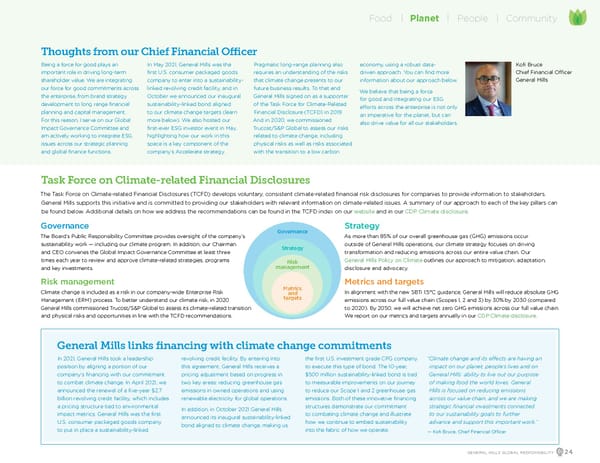Risk management Climate change is included as a risk in our company-wide Enterprise Risk Management (ERM) process. To better understand our climate risk, in 2020 General Mills commissioned Trucost/S&P Global to assess its climate-related transition and physical risks and opportunities in line with the TCFD recommendations. The Task Force on Climate-related Financial Disclosures (TCFD) develops voluntary, consistent climate-related financial risk disclosures for companies to provide information to stakeholders. General Mills supports this initiative and is committed to providing our stakeholders with relevant information on climate-related issues. A summary of our approach to each of the key pillars can be found below. Additional details on how we address the recommendations can be found in the TCFD index on our website and in our CDP Climate disclosure . Task Force on Climate-related Financial Disclosures Governance Strategy Risk management Metrics and targets Governance The Board’s Public Responsibility Committee provides oversight of the company’s sustainability work — including our climate program. In addition, our Chairman and CEO convenes the Global Impact Governance Committee at least three times each year to review and approve climate-related strategies, programs and key investments. Strategy As more than 85% of our overall greenhouse gas (GHG) emissions occur outside of General Mills operations, our climate strategy focuses on driving transformation and reducing emissions across our entire value chain. Our General Mills Policy on Climate outlines our approach to mitigation, adaptation, disclosure and advocacy. Metrics and targets In alignment with the new SBTi 1.5°C guidance, General Mills will reduce absolute GHG emissions across our full value chain (Scopes 1, 2 and 3) by 30% by 2030 (compared to 2020). By 2050, we will achieve net zero GHG emissions across our full value chain. We report on our metrics and targets annually in our CDP Climate disclosure . In 2021, General Mills took a leadership position by aligning a portion of our company’s financing with our commitment to combat climate change. In April 2021, we announced the renewal of a five-year $2.7 billion revolving credit facility, which includes a pricing structure tied to environmental impact metrics. General Mills was the first U.S. consumer packaged goods company to put in place a sustainability-linked revolving credit facility. By entering into this agreement, General Mills receives a pricing adjustment based on progress in two key areas: reducing greenhouse gas emissions in owned operations and using renewable electricity for global operations. In addition, in October 2021 General Mills announced its inaugural sustainability-linked bond aligned to climate change, making us the first U.S. investment grade CPG company to execute this type of bond. The 10-year, $500 million sustainability-linked bond is tied to measurable improvements on our journey to reduce our Scope 1 and 2 greenhouse gas emissions. Both of these innovative financing structures demonstrate our commitment to combating climate change and illustrate how we continue to embed sustainability into the fabric of how we operate. “Climate change and its effects are having an impact on our planet, people’s lives and on General Mills’ ability to live out our purpose of making food the world loves. General Mills is focused on reducing emissions across our value chain, and we are making strategic financial investments connected to our sustainability goals to further advance and support this important work.” — Kofi Bruce, Chief Financial Officer General Mills links financing with climate change commitments Being a force for good plays an important role in driving long-term shareholder value. We are integrating our force for good commitments across the enterprise, from brand strategy development to long range financial planning and capital management. For this reason, I serve on our Global Impact Governance Committee and am actively working to integrate ESG issues across our strategic planning and global finance functions. In May 2021, General Mills was the first U.S. consumer packaged goods company to enter into a sustainability- linked revolving credit facility, and in October we announced our inaugural sustainability-linked bond aligned to our climate change targets (learn more below). We also hosted our first-ever ESG investor event in May, highlighting how our work in this space is a key component of the company’s Accelerate strategy. Pragmatic long-range planning also requires an understanding of the risks that climate change presents to our future business results. To that end General Mills signed on as a supporter of the Task Force for Climate-Related Financial Disclosure (TCFD) in 2019. And in 2020, we commissioned Trucost/S&P Global to assess our risks related to climate change, including physical risks as well as risks associated with the transition to a low carbon economy, using a robust data- driven approach. You can find more information about our approach below. We believe that being a force for good and integrating our ESG efforts across the enterprise is not only an imperative for the planet, but can also drive value for all our stakeholders. Kofi Bruce Chief Financial Officer General Mills Thoughts from our Chief Financial Officer GENERAL MILLS GLOBAL RESPONSIBILITY 24 Food Planet People Community
 GeneralMills Global Responsibility Report Page 25 Page 27
GeneralMills Global Responsibility Report Page 25 Page 27